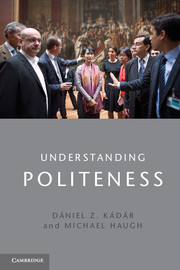Foreword
Published online by Cambridge University Press: 05 June 2014
Summary
‘What is it you are researching?? Politeness?!? You teach ‘politeness’? You teach others how to be polite?! Mention ‘politeness’ as one of your research interests or topics you teach, and the reaction of many colleagues and friends is likely to be a mixture of incredulity, disbelief, mild condescendence and a hint of disapproval. Serious social scientists cannot possibly invest time and intellectual resources in the pursuit of what sounds like a topic for genteel conversation among members of a gone-by civil society inhabiting drawing-rooms and parlours!
Politeness as a topic of multidisciplinary inquiry has attracted the sustained attention of scholars for at least four decades; the effects of the discursive turn that has invested the social sciences have been felt in many of the recent monographic studies on manifestations of (im)politeness in various social contexts, a development that is indicative of a new vitality in the field. It is against this background that this book emerges to address new and non-expert readerships and to invite them on an exploration of the conceptual and empirical richness that have come to characterize politeness studies.
- Type
- Chapter
- Information
- Understanding Politeness , pp. xi - xiiPublisher: Cambridge University PressPrint publication year: 2013



